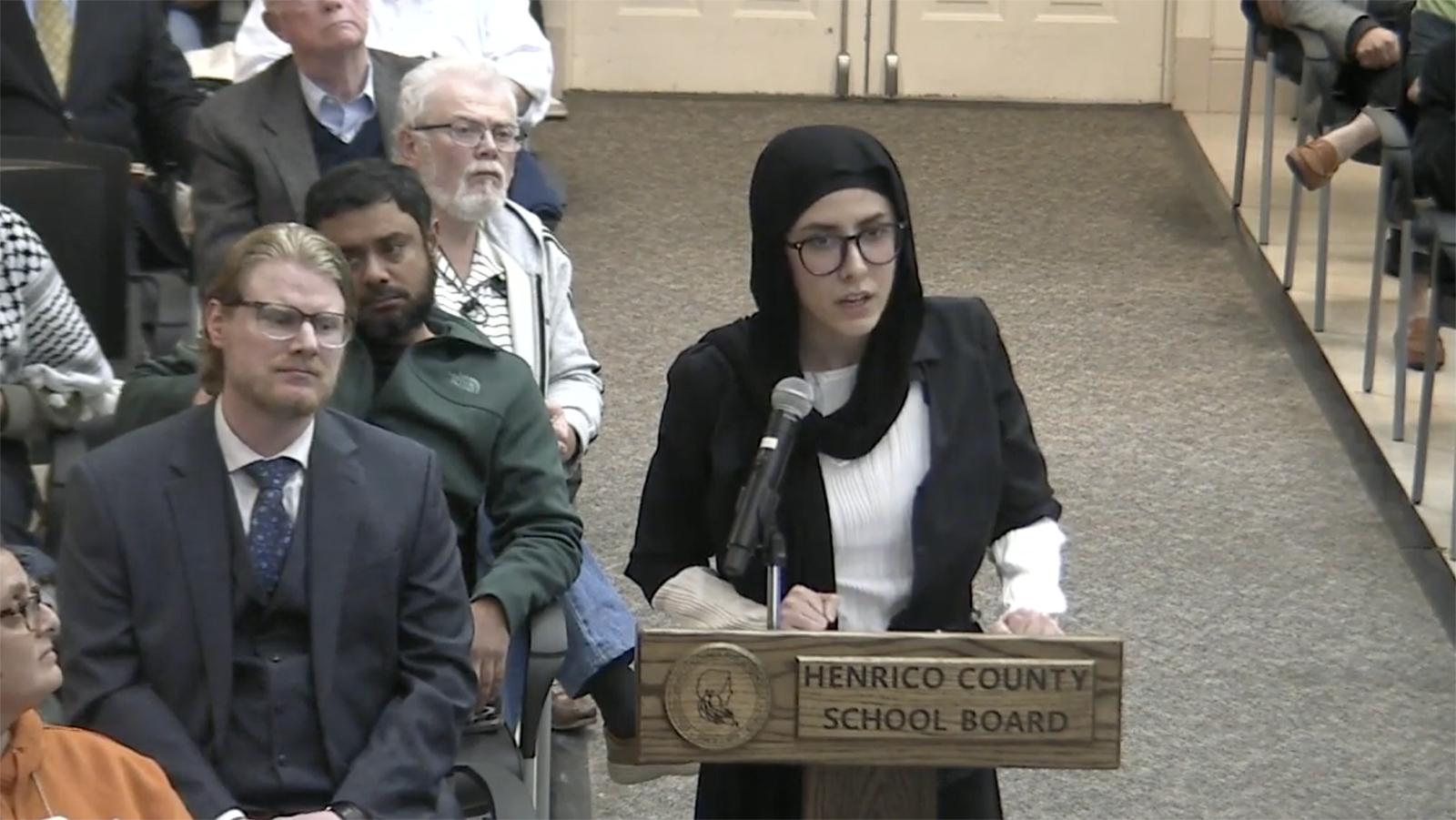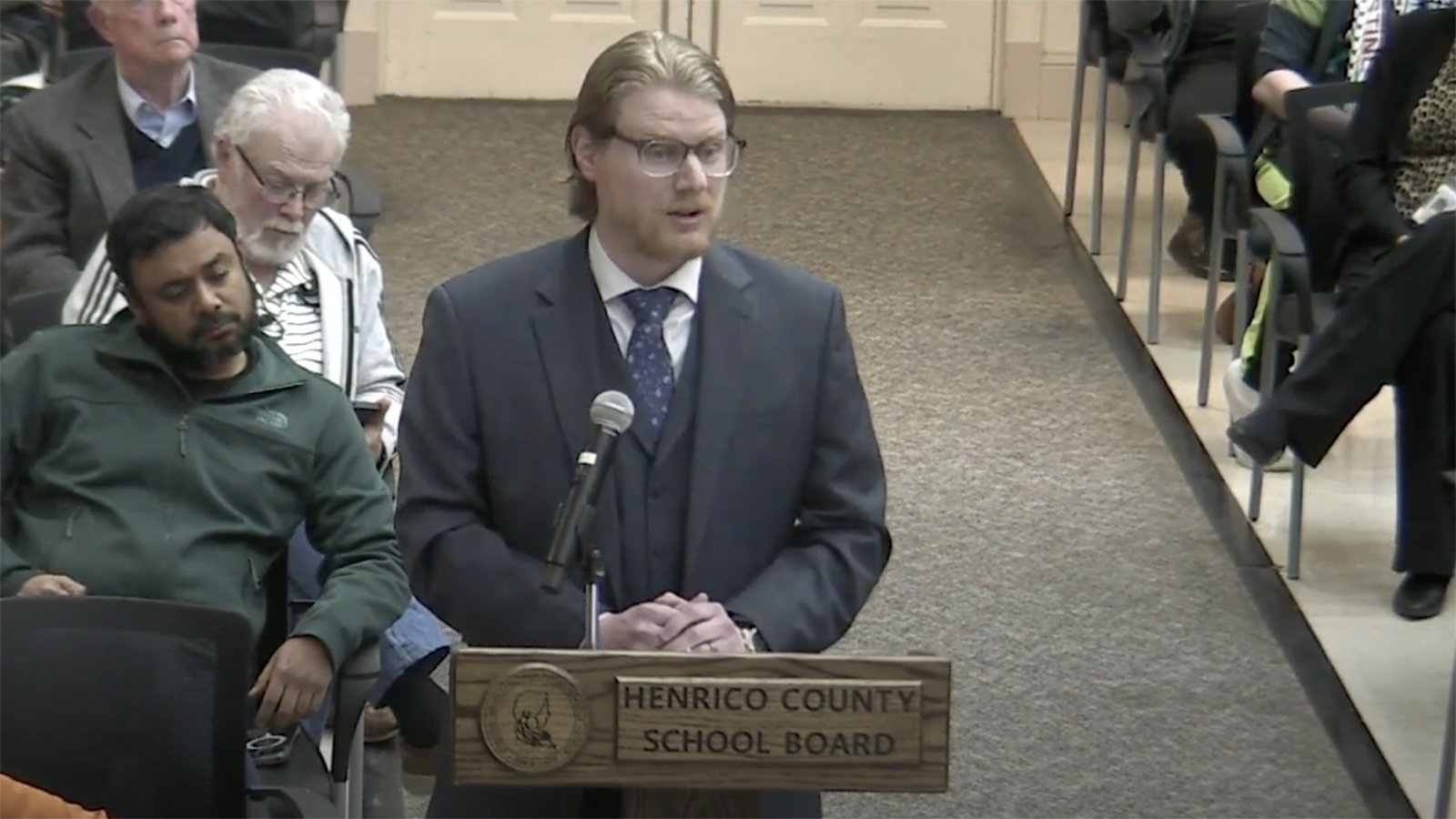(RNS) — It started with a WhatsApp notification on my phone from one of our local mosque groups sharing the news that a teacher near me at Deep Run High School outside Richmond, Virginia, had been recorded by a student as she spoke about the war in Gaza in class.
It culminated in a contentious school board meeting during which numerous speakers called for the teacher, Catherine Massalha, who has been removed from teaching but is still working for the district, to be dismissed, while warning of an “infiltration of Hamas” in the area’s schools. Other parents, residents and students spoke up for Massalha, asking school officials to establish better policies about teaching complicated topics and to protect Muslim and other minority kids from bullying and discrimination.
The story broke in late January, when the conservative Washington Examiner ran the 12-minute recording of Massalha, a history teacher, saying that Israel has committed war crimes in its military action in Gaza and that the United States is complicit in genocide. She also encouraged students to become activists themselves. At the time, South Africa had lodged a complaint against Israel, and these topics were much talked about.
In the weeks following, Deep Run High School Muslim students reported feeling bullied, scrutinized and otherized, as have students at other high schools in the district. The day Massalha was suspended from teaching, a Trump sticker was slapped on the door of her home. Days later, protesters stood just outside high school property near dismissal time holding signs that read “No Hamas in School.”
At the school board meeting, Deep Run student Athena Savoji reported that her hijab had been pulled, while students at other schools, some of whom I know from community and mosque events, told me that they felt they were facing extra scrutiny and microaggressions.

Deep Run High School senior Athena Savoji speaks during a Henrico County Public Schools board meeting on Feb. 22, 2024, in Henrico, Virginia. (Video screen grab)
Against this tension-filled backdrop, parents worry what their children are being taught (or not) in school. Some parents accused Massalha of violating the district’s policy on “controversial subjects,” which states that teachers must “exert their most conscientious efforts to present facts objectively and impartially.” Students, meanwhile, are frustrated (and a little scared) by their inability to speak freely about their experiences or the current events unfolding around them.
Charles Turner, a board member for the Virginia Muslim Civic League, who commented publicly at the school board meeting, told me that it feels as if school districts are telling their communities “who we get to support and who we do not get to support, whose grief gets validated and whose grief is considered disruptive.”
While school districts may direct how their teachers teach, Turner added, “what kind of environment is being created for Muslim — and all — students at the schools?”
These are the questions I’ve been wrestling with as I shepherd my son, the last of my three kids, through high school elsewhere in the district: Whose truths are valid? Whose stories are allowed to be told? Who gets to be authentic, and who has to code switch or keep their identity on lockdown?
Sara Jamal, a parent of children in every level of the school district in question, responded to several public comments at the school board meeting that upset, frustrated and angered several other local Muslims in attendance. “Are we teaching our children to shy away from conversations about difficult or complicated topics?” she asked. “To what extent does this avoidance impede the integration of real-life experiences to enrich the curriculum?”
“And what about our children’s level of trust in their own schools,” Jamal wanted to know. “Are their schools creating a sense of belonging and encouraging them to confide in their teachers and other school leaders? Can they come to them about bullying and discrimination?”
Later Jamal shared her frustration with me. “I feel a little dejected by this thing,” she said, “about what is happening to people who speak out. I don’t know what to do beyond continuing to be an advocate for my children.”
At my son’s school, as at other high schools across the country, there is a Muslim Student Association. Last fall, the school’s the principal dropped in on an MSA meeting. The reason for his visit? Some students had put up Palestinian flag posters and posters with “Free Palestine” written on them, drawing complaints from other students. The principal told the Muslim kids that any signs at school events going forward required his approval before being posted.
The MSA students argued that signs on behalf of Black Lives Matter, Pride Month or solidarity with Ukraine had not required approval. So why Palestine? Why now?
Muslims are facing similar challenges elsewhere. At Potomac Falls High School in Sterling, Virginia, more than 200 students walked out of their last-period class to show solidarity for Gaza. In nearby Loudon County, students planned a walkout on the same day, but it was canceled in deference to pro-Israel demonstrations organized for the same day.
In November in Orange County, California, a 13-year-old student at Corona del Mar High School was suspended for saying “Free Palestine.”
Zoom out from the current push-pull over Israel and Palestine and there is a larger issue: What do we tell teachers who want to push students to think more deeply about topics that may make them uncomfortable? Several school districts and states heavily regulate how teachers can discuss “racism, sexism and issues of systemic inequality in the classroom.” Do we want to bar them from discussing conflicts that appear on the front pages as well?
Shahir Saeed, a student at Deep Run and the current president of the school’s MSA, said students, from what he knows, have not been able to openly discuss the war in Gaza. “My history teacher only mentioned ‘conflict in the Middle East’ and didn’t go into any more detail.”
In the absence of policy, we get confrontations, at school board meetings and in hallways. “We haven’t gotten any information about what exactly is defined as ‘off the curriculum,’ what is defined as ‘disruptive’ and what is defined as ‘controversial topics,’” said Turner.

Charles Turner speaks during a Henrico County Public Schools board meeting on Feb. 22, 2024. (Video screen grab)
Religion, politics, wars, genocides, racism, sexism, history: there’s no shortage of situations where students’ identities and personal truths cross with educational topics, and it’s left to teachers in many cases not only to educate our kids but also support them in many different ways. Muneeza Saeed, Shahir’s mother, told me that Massalha was Deep Run’s MSA faculty adviser. Her classroom was a safe space where many Muslim students went to pray.
Those things matter, just as much as it matters for any student from a marginalized group to feel safe and supported.
I’m reminded of eavesdropping on my daughter’s A.P. government class on Jan. 6, 2021 — in the middle of a COVID-19 school year, the class was taking place on her laptop as the insurrection at the U.S. Capitol was unfolding on our family television. I listened to her teacher lead the class in real-time discussions about the insurrection, the accusations of stealing an election, the voting process, Trump, Biden and more, with students weighing in on all sides of the topics.
It was a masterful teaching moment and a reminder to me of how difficult topics with passionate viewpoints can be taught and how students who are scared can feel safe enough to share their truths.
(Dilshad D. Ali is a freelance journalist. The views expressed in this commentary do not necessarily reflect those of Religion News Service.)
Discover more from CaveNews Times
Subscribe to get the latest posts sent to your email.


























![Exploring the Serene Beauty of Nature: A Reflection on [YouTube video title]](https://cavemangardens.art/storage/2024/04/114803-exploring-the-serene-beauty-of-nature-a-reflection-on-youtube-video-title-360x180.jpg)


























